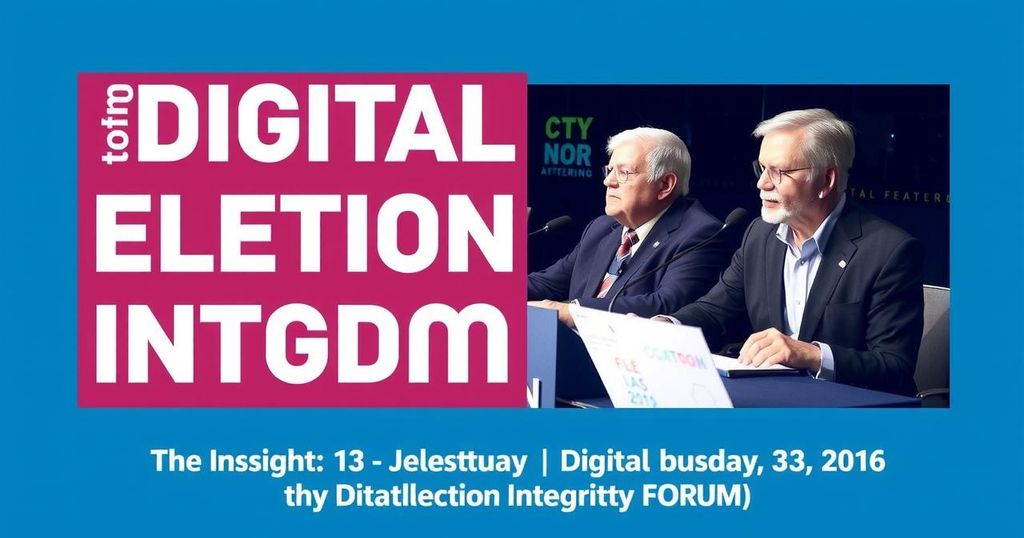At IGF 2024, panelists convened to address election integrity challenges due to misinformation and emerging technologies like AI and deepfakes. With over 65 elections in 2024, experts called for collaborative solutions to safeguard democratic processes, emphasizing the importance of tailored policies for different regions and robust accountability measures for technology companies.
The discussions at the Internet Governance Forum (IGF) 2024 brought to the forefront the pressing challenges associated with election integrity in the digital landscape. Panelists, representing various sectors and regions, underlined the critical threats posed by misinformation, disinformation, and emerging technologies such as artificial intelligence (AI) and deepfakes. With the year being designated as a ‘super election year’ with over 65 elections globally, experts stressed the urgency of fostering multistakeholder solutions to address these risks effectively.
The discussion highlighted the alarming rise of disinformation, described by Tawfik Jelassi from UNESCO as a primary global risk. He warned, “Without facts, there is no trust, and without trust, democracy falters,” emphasizing the rapid spread of misinformation compared to verified content, which complicates the public’s trust in electoral processes. His fellow panelists, William Bird of Media Monitoring Africa and Lina Viltrakiene from the Lithuanian government, elaborated on how malicious actors exploit digital platforms to distort voter perceptions through deepfakes and orchestrated deceptive activities.
Elizabeth Orembo from ICT Africa drew attention to the significant disparities experienced by the Global South, where the digital divide heavily undermines media access and leaves populations susceptible to misleading information. She stated, “We cannot apply blanket policies from tech companies without addressing regional contexts,” advocating for tailored policies that consider both infrastructural and cultural differences within these regions.
Sezen Yesil from Meta discussed the social media giant’s initiatives to counter threats associated with elections, including the tightening of restrictions against fake accounts and fostering collaboration with fact-checkers. Although concerns regarding AI-driven disinformation persist, she observed that the expected impact of generative AI during the 2024 elections appears to be limited. Nonetheless, panelists united in the call for enhanced accountability measures for technology corporations, with a particular emphasis on frameworks like the EU’s Digital Services Act.
A recurrent theme throughout the session was the necessity for multistakeholder collaboration. Rosemary Sinclair from Australia’s AUDA emphasized that preserving democracy is a collective responsibility, stating, “Safeguarding democracy is a ‘global team sport,’ requiring contributions from governments, civil society, academia, and the technical community.” The IGF was recognized as a pivotal platform for nurturing global cooperation in this endeavor, highlighting the necessity for continued efforts to sustain trust beyond election periods.
The discussions at IGF 2024 focused on the critical issue of election integrity amid the challenges posed by misinformation and disinformation in the digital realm. Notably referred to as a ‘super election year,’ the session underscored the urgency of addressing the threats that over 65 global elections present, stressing the importance of collaborative solutions from various stakeholders. The rise of technology, especially AI and social media, has introduced complex dynamics that further jeopardize democratic processes, necessitating comprehensive discussions on governance, accountability, and cooperation across sectors.
In conclusion, the panel discussions at IGF 2024 underscored the imperative of addressing election integrity and the associated threats of digital misinformation. The insights provided by experts from diverse sectors illuminate the urgent need for coordinated efforts among governments, technology companies, and civil society to safeguard democracy. Continuous dialogue and action are crucial for building trust, mitigating digital inequalities, and developing regulatory frameworks that can adapt to the evolving landscape of digital governance.
Original Source: dig.watch






